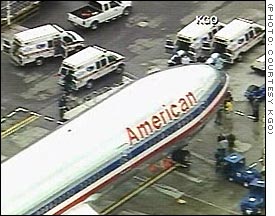NEW YORK (CNN/Money) - Nearly 30 percent of corporations whose employees make frequent trips to Asia have banned travel there because of the mysterious virus that has killed 63 people, according to a survey released Tuesday.
A survey of 180 organizations and Fortune 500 companies that combined accounted for 66,960 annual roundtrips to Asian countries found that 49, or 27 percent, were banning travel to Asian countries, according to the Business Travel Coalition.
Forty-three, or 24 percent of participants, said they were taking no action. Eight percent were considering a ban on travel to Asian countries and 41 percent were just providing advisories and guidance.
 |
|
| American Airlines Flight 128 in San Jose, Calif., Tuesday. |
The survey taken Tuesday appears to back up anecdotal evidence that the virus' health risks have deterred travel, hurting an airline industry battered by war in Iraq, terrorism fears and a sluggish economy.
Officials in Hong Kong and Singapore have quarantined people, a practice that temporarily spread to the United States Tuesday.
A plane flying from Tokyo was kept on the tarmac at San Jose International Airport for about an hour Tuesday after three or four passengers reported symptoms of the pneumonia-like virus, a Federal Aviation Administration spokesman said.
The affected passengers on American Airlines Flight 128 were taken to a clinic by Santa Clara County health officials. Hospital officials concluded that they did not have the disease and they were released.
James Awad, of Awad Asset Management, said that if the illness gains ground domestically, people may be more inclined to stay home in a development that could hurt retail spending.
"It has the potential to diminish economic activity," Awad told CNNfn. "It can't be a positive on the economy."
| 
| |

| 
| 
|

|
 In Asia, financial markets are coming under increasing pressure as countries start to feel the economic impact of the mystery virus known as Severe Acute Respiratory Syndrome, or SARS. In Asia, financial markets are coming under increasing pressure as countries start to feel the economic impact of the mystery virus known as Severe Acute Respiratory Syndrome, or SARS.
|
|
Play video
(QuickTime, Real or Windows Media)
|
| 
|

|
|
The Centers for Disease Control advises people to postpone nonessential travel to mainland China, Hong Kong, Singapore, and Hanoi, Vietnam.
One of the latest cancelations came from the World Economic Forum, which postponed a summit in Beijing until sometime this autumn. The event was scheduled for this month.
The Business Travel Coalition's survey polled participants who fly from the United States, Canada, and Europe and spend $268 million a year on air travel to Asia.
Asked about specific countries they are avoiding, those surveyed focused on mainland China and Hong Kong, where a combined 50 people have died.
Asked to identify countries that travel is being banned to, 40, or 82 percent, said mainland China. Forty-nine, or 100 percent, said Hong Kong. Singapore was next, followed by Vietnam.
The World Health Organization said there have been 1,804 cases of Severe Acute Respiratory Syndrome, or SARS, spread across three continents. Symptoms include high fever, dry cough, shortness of breath or breathing difficulties.
"We are suggesting that travelers consider postponing trips to infected regions of China, Hong Kong, Taiwan and Singapore," one unidentified survey participant wrote, according to the Business Travel Coalition. "We are also gathering data on infected areas of Canada."
But others in the survey suggested that conflicting information made decision-making tough.
"It is difficult to separate media hype from possible attempts by officialdom to subdue panic," one said. "However, the deaths among fit Westerners seem to be almost zero."
The airline industry has lost billions of dollars since the Sept. 11 terrorist attacks and the 2001 recession hit travel. Airlines have cut more flights since the war in Iraq began last month
A report Tuesday from credit-rating agency Fitch estimated that this month's war-related cash losses at American Airlines could range from $130 million to $150 million.
At United, which is operating under bankruptcy protection, war-related cash losses this month could range from $125 million to $145 million, according to Fitch, which put Delta's loss estimate this month at $90 million to $110 million.
| Related Stories
|

|
|
|
|
Fitch made no mention of SARS, a illness whose "speed of international travel," according to the World Health Organization, "creates a risk that cases can rapidly spread around the world."

|

